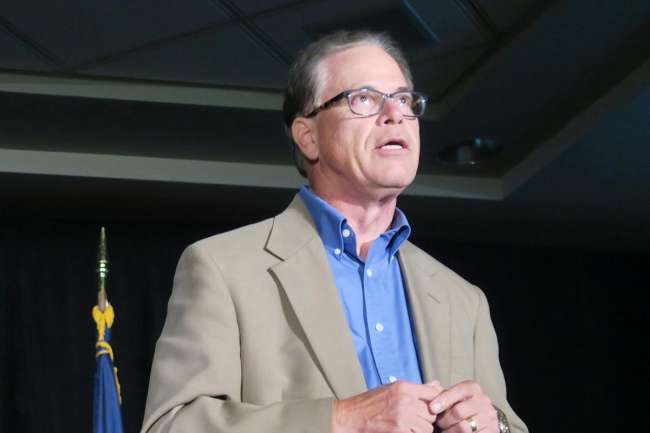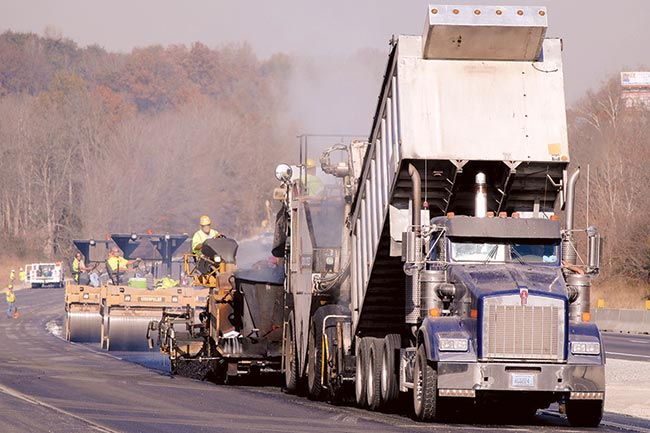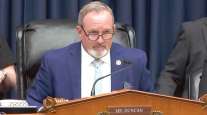Staff Reporter
Indiana Sen. Mike Braun Envisions Infrastructure Plan Bigger Than Trump’s

[Stay on top of transportation news: Get TTNews in your inbox.]
INDIANAPOLIS — The nation needs an even larger infrastructure bill than the one proposed by President Donald Trump, an Indiana senator told an audience at the National Accounting and Finance Council’s 2019 annual conference.
U.S. Sen. Mike Braun (R-Ind.), a former trucking company founder and CEO, said he envisions an infrastructure bill of between $3 trillion to $4 trillion, spent over 10 to 15 years. Trump has championed a $2 trillion proposal to fix U.S. infrastructure.
It was a surprising stance for Braun to take, as he defeated an incumbent Indiana Democrat and was elected in 2018 in part because of two things: his conservative positions and his support of Trump.
But Braun said fixing infrastructure faces a big hurdle, not because of the price tag but because of how Washington works — or how slowly it works.
Braun brought up some potential issues with an infrastructure plan. “Will the other side, especially the House, allow anything to go forward if it’s a feather in President Trump’s cap,” he said.
Braun said another concern is how Congress pays for things. He said the federal government has been taking a “20% loss” annually for a decade and has been financing the gap “on a credit card.”
Braun often derided the federal government for being $22 trillion in debt and said it will take the nation coming to the edge of financial calamity before Congress acts.
Kicking off our 2019 Annual Conference with the Honorable Senator Mike Braun, a veteran businessman in the trucking industry! #NAFC19 @SenMikeBraun @TRUCKINGdotORG pic.twitter.com/MPDEYUVprf — NAFC Trucking (@NAFC_ATA) June 10, 2019
Braun sits on the Senate Budget Committee and the Senate Committee on Environment and Public Works, two key infrastructure panels. But Washington politics has infected the work those committees should be doing, he said.
“A lot of people don’t show up for the [committee] meetings,” Braun said. “It kind of represents the tenor of what is going on in our government. I don’t want to thoroughly depress you, because that is a true depiction with what’s happening with the biggest business in the world.”
Braun responded to a question from a trucking firm official about his ideas for infrastructure, explaining he learned from his experience as a state representative from Jasper. Braun served in the Indiana House of Representatives from 2014 to 2017. He resigned halfway through his second term to run for U.S. Senate, running in a state that rarely elects candidates with little public office experience.
Braun said Indiana’s roads and bridges were hurting for repair and expansion, but he was discouraged by advisers to mention a GOP plan to raise gasoline and diesel taxes.

Construction on an Indiana road. (Indiana Department of Transportation)
“Seven to eight percent of roads and bridges were in need of repair,” he said. “Seventy percent of Hoosiers … wanted better highways and bridges. Seventy percent of Hoosiers did not want to pay for it.”
But Braun signed on to a state gas tax increase — a “user fee,” he said — of 10 more cents on a gallon of gasoline and 20 more cents on a gallon of diesel, after GOP leadership in the Indiana House and Senate came out with a state infrastructure plan. Braun said he felt assured about a gas tax increase because Indiana’s fiscal health was good and the state had excelled at being a low tax success story in the Midwest.
Braun said a vehicle-miles-traveled tax “would not have gotten to first base” in the 2017 Indiana gas tax legislation, and a fuel tax likely is the way to go at the federal level. Fuel taxes have not been raised by the federal government since 1993, and the revenue used to repair roads and bridges is shrinking.
Braun said Senate Majority Leader Mitch McConnell (R-Ky.) told him that he thinks a higher gas tax is regressive, hurting the poor most of all. But Braun said the Indiana gas tax hike only cost the average Hoosier who drives 15,000 miles a year about $60.
Braun was the founder of Meyer Logistics, a trucking company based in Jasper, and of Meyer Distributing, an auto parts distribution business. His opponents dragged his companies through the mud, he said.
“I never heard an ill word about my company until I ran for Senate,” Braun told the audience.
Still, Braun said Indiana’s bruising 2018 GOP primary and then his victory over Democratic incumbent Joe Donnelly (D-Ind.) were all worth it.
“What a time to be a U.S. senator,” he said.




